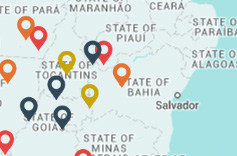Tonico Benites, Guarani-Kaiowá (Mato Grosso do Sul)
On-site research to map the violence practiced against indigenous families of the Guarani-Kaiowá people of Mato Grosso do Sul
Mato Grosso do Sul
Objectives and target population:
Pedagogue and anthropologist Tonico Benites has proposed an on-site research project to map, evaluate and report violence practiced against indigenous families of the Guarani-Kaiowá people, in the south of Mato Grosso do Sul, who claim part of the traditional territories from which they were expelled decades ago. According to the researcher, these families suffer eviction orders, death threats, torture, kidnapping, gunman attacks, assassination and other aggression. Roughly two thousand indigenous people will directly benefit.
Main activities:
– Organize a multidisciplinary team along with Guarani-Kaiowá leaders from the Aty Guasu (representative assembly of the Guarani-Kaiowá people) to hold scheduled visits with twenty encampments in conflict;
– Accompany the service that indigenous people receive from public institutions, especially with regard to safety, schooling and health care;
– Forward the most urgent demands from the community to relevant government authorities so they can take the required action;
– Close with a large meeting to discuss the results of the visits and plans to continue with this work after the project has ended;
– Build, together with local indigenous residents, a representative organization for Guarani-Kaiowá leadership.
Context:
For much of the 20th century the history of the Guarani-Kaiowá in the south of Mato Grosso do Sul was marked by government attempts to reduce their territory. Despite these attempts, the Guarani-Kaiowá never stopped occupying the entirety of their territories from which they were expelled. Since the beginning of the 1980s, countless indigenous families have claimed the demarcation of part of their territories that were occupied by their ancestors.
In the indigenous encampments located in litigious regions, children, women and elderly, for example, have difficulty receiving any kind of public services, impeding their rights to education and health care. Where indigenous people have been victims of attacks leading to deaths, those responsible for carrying out and ordering the crimes are never investigated and punished by public institutions, thus creating an environment of insecurity.
Around 46 thousand indigenous people belong to the Guarani-Kaiowá and Ñandeva ethnicities in 26 municipalities of the southern cone of Mato Grosso do Sul. The greatest part is distributed among eight reservations/posts, demarcated by the Indian Protection Services between 1915 and 1928; another portion of this population has settled on part of their re-occupied territories, currently in a process of identification, demarcation and title normalization since the 1980s, 1990s and 2000s. There are also eight groups of Guarani and Kaiowá expelled from their traditional land that are today encamped on the federal highway and six groups in a small corner of their old lands, awaiting identification and official recognition.
About the project leader:
Tonico Benites, a Guarani-Kaiowá himself, is a doctoral student in Social Anthropology at the National Museum of the Federal University of Rio de Janeiro (UFRJ) and a researcher with the CNPq.
Funding Line
Annual Call for Proposals
Year
-
Total Granted
-
Duration
-
Main Themes
Indigenous peoples' rights






